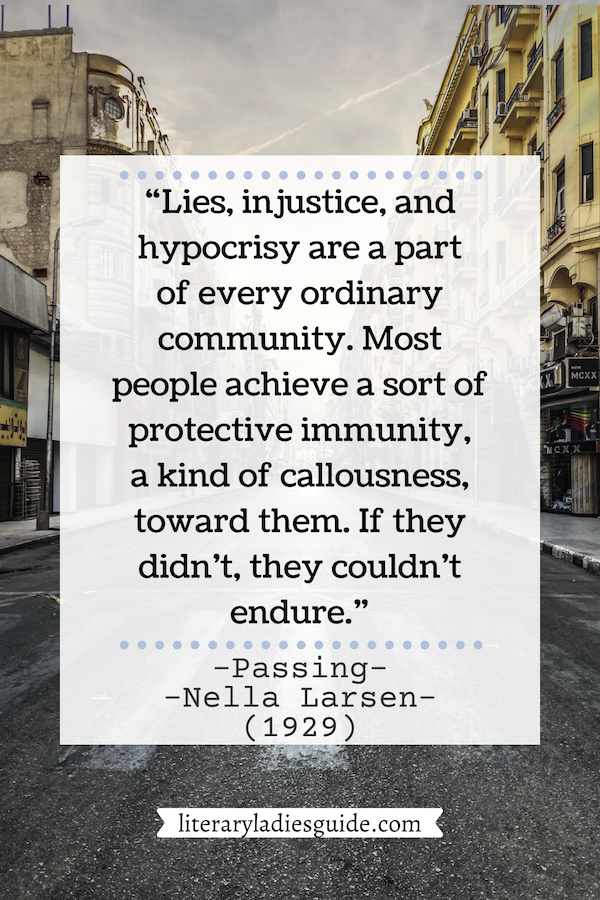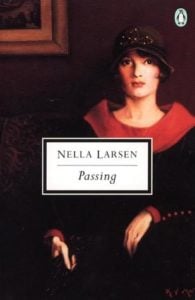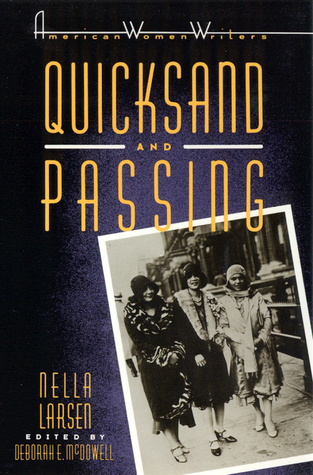Insightful Quotes from Passing by Nella Larsen
By Emma Ward | On April 10, 2017 | Updated October 17, 2022 | Comments (0)

Nella Larsen‘s 1929 novella Passing focuses on two middle-class Black women who reunite after a long break from their childhood friendship. Following are some insightful quotes from Passing by Nella Larsen, a classic novel of the Harlem Renaissance era.
Passing is the story of two friends, Irene and Clare, both of mixed race, and both who present a mostly white appearance.
But Clare has chosen to cross over the color line to live as white, even having married a white man who turns out to be a bigot. Irene “passes” when convenient, but lives in the Black community with her Black doctor husband and two sons. The women reunite after an absence of twelve years from their friendship, with dramatic consequences.
In her introduction to the 1992 edition of the 1929 novel, Thadious M. Davis observed:
“In portraying Clare, who becomes white, and Irene, who passes occasionally, Larsen represents passing as a practical, emancipatory option, a means by which people of African descent could permeate what W.E.B. Du Bois themed ‘the veil of color caste.’
Larsen defines passing in a meeting between Clare and Irene as a simple but ‘hazardous business,’ requiring ‘breaking away from all that was familiar and friendly to take one’s chance in another environment, not entirely strange, perhaps, but certainly not entirely friendly.’
. . . . . . . . . .

Passing (1929): An Introduction
. . . . . . . . . .
Nella Larsen was the first woman of color to graduate from library school and to receive the Guggenheim Fellowship for creative writing.
The daughter of a white Danish immigrant mother and a mixed-race father from the Danish West Indies, Larsen wove the sense of non-belonging into her work, which reflected her life. She never quite fit in with either the Black or white communities, nor even to her immediate family.
Though her first novel, Quicksand (1928), contained more obviously autobiographical elements, Passing also reflected Larsen’s lifelong sense of alienation and search for identity.
. . . . . . . . . .
“It’s funny about ‘passing.’ We disapprove of it and at the same time condone it. It excites our contempt and yet we rather admire it. Why shy away from it with an odd kind of revulsion, but we protect it.”
. . . . . . . . . .

. . . . . . . . . .
“Lies, injustice, and hypocrisy are a part of every ordinary community. Most people achieve a sort of protective immunity, a kind of callousness, toward them. If they didn’t, they couldn’t endure.”
. . . . . . . . .
“Catlike. Certainly that was the word which best described Clare Kendry, if any single word could describe her. Sometimes she was hard and apparently without feeling at all; sometimes she was passionate and rashly impulsive. And there was about her an amazing soft malice, hidden well away until provoked.”
. . . . . . . . . .
“She isn’t stupid. She’s intelligent enough in a purely feminine way. Eighteenth-century France would have been a marvelous setting for her, or the old South if she hadn’t made the mistake of being born a Negro.”
. . . . . . . . . .
“ … she hadn’t the air of a woman whose life had been touched by uncertainty or suffering. Pain, fear, and grief were things that left their mark on people. Even love, that exquisite torturing emotion, left its subtle traces on the countenance.”
. . . . . . . . . .
See also: Renaissance Women: 12 Female Writers
of the Harlem Renaissance
. . . . . . . . . .
“The trouble with Clare was, not only that she wanted to have her cake and eat it too, but that she wanted to nibble at the cakes of other folk as well.”
. . . . . . . . . .
“She was caught between two allegiances, different, yet the same. Herself. Her race. Race! The thing that bound and suffocated her. Whatever steps she took, or if she took none at all, something would be crushed. A person or the race. Clare, herself, or the race.”
. . . . . . . . . .
“She wished to find out about this hazardous business of passing, this breaking away from all that was familiar and friendly to take one’s chances in another environment, not entirely strange, perhaps, but certainly not entirely friendly.”
. . . . . . . . . .
“I’ve often wondered why more colored girls … never ‘passed’ over. It’s such a frightfully easy thing to do. If one’s the type, all that’s needed is a little nerve.”
. . . . . . . . . .
RELATED POSTS
In Search of Nella Larsen by George Hutchinson
Two 1928 Reviews of Quicksand by Nella Larsen
Quotes from Quicksand and Others by Nella Larsen
. . . . . . . . . .
“Was she never to be free of it, that fear which crouched, always, deep down within her, stealing away the sense of security, the feeling of permanence, from the life which she had so admirably arranged for them all, and desired so ardently to have remain as it was?”
. . . . . . . . . .
“Clare began to talk, steering carefully away from anything that might lead towards race or other thorny subjects. It was the most brilliant exhibition of conversational weightlifting that Irene had ever seen.”
. . . . . . . . . .
“Strange, that she couldn’t now be sure that she had ever truly known love. Not even for Brian. He was her husband and the father of her sons. But was he anything more? Had she ever wanted or tried for more? In that hour she thought not.”
. . . . . . . . . .
“Brought to the edge of distasteful reality, her fastidious nature did not recoil. Better, far better, to share him than to lose him completely. Oh, she could close her eyes, if need be. She could bear it.”
. . . . . . . . . .
“But she did not look the future in the face. She wanted to feel nothing, to think nothing; simply to believe that it was all silly invention on her part. Yet she could not. Not quite.”
. . . . . . . . . .
“‘Children aren’t everything,” was Clare Kendry’s answer to that. “There are other things in the world, though I admit some people don’t seem to suspect it.’ And she laughed, more, it seemed, at some secret joke of her own than at her words.”
. . . . . . . . . .
“Sitting alone in the quiet living room in the pleasant firelight, Irene Redfield wished, for the first time in her life that she had not been born a Negro. For the first time she suffered and rebelled because she was unable to disregard the burden of race. It was, she cried silently, enough to suffer as a woman, an individual, on one’s own account, without having to suffer for the race as well. It was a brutality, and undeserved. Surely no other people so cursed as Ham’s dark children.”



Leave a Reply